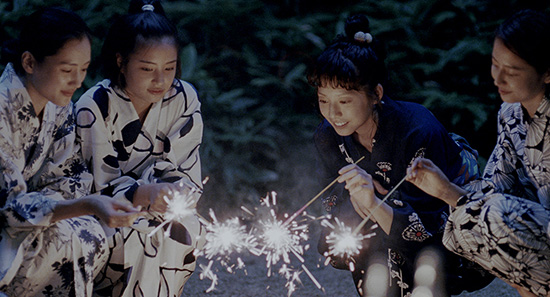There is something cinematic about the firework: concentrated momentum, bright and loud, but more ephemeral than the projected screen. The alchemic nature of the rocket or roman candle is akin to the earliest cinematic scientific experimentation; the chemicals of a firework shatter themselves upon releasing light, whilst celluloid, in sacrifice of the captured image, is part-destroyed upon exposure.
The swooping, booming, colour-drenching blasts of fireworks don’t immediately bring the unassuming, delicately soulful dramas of Hirokazu Kore-eda to mind. The colourful barbs Deneuve and Juliette Binoche in the director’s upcoming french language feature The Truth are certainly conversational firecrackers, but the literal fireworks of two of his most recent features finds a serenity in the flames. When photographing neon stitched darkness, the Japanese director’s firework displays aren’t just explosions in the sky, they’re catalysts for moments of togetherness. They don’t just unify audiences in their viewing, but reflect the communal cinematic experience back to them.
Shivering and huddled in a muddy field with soddening football socks tucked into welly boots, or on the firm streets of a city, shoulder to shoulder in urban awe – to gaze at gunpowder and find solace from the dark is a unifying experience. Perhaps with less mud, hopefully with less cold, and with optional welly boots, the cinema can create that same feeling of wonder and connection. This is what Kore-eda reminds us as we sit in theatres and marvel at his pyrotechnics and how his characters watch them.
Kore-eda’s 2018 Palme d’Or-winning Shoplifters and his 2015 work Our Little Sister both feature people living together outside of traditional familial bonds. In Our Little Sister, three cohabiting sisters welcome the daughter their recently deceased father had, after leaving their mother. Any melodrama in the situation is diffused by the siblings through the excitement and warmth they feel for their new housemate. Although there might be tension amidst the older generations, the sisters respect and love each other equally. Shoplifters finds a similarly kind, generous group of people sharing a home, albeit with less shared DNA. Instead of sisters and daughters, we’re watching a band of criminals and the abandoned children they try to support. Whilst the morality of their actions is extremely questionable, the heart with which they approach it and their own definitions of family is remarkably nourishing.
In one standout moment from Shoplifters, the family sit on the small balcony of their ramshackle home and crane their heads to share in the spectrum-lit sky. Generations who may not share branches of a family tree, but whose lives and affection are so richly entwined, are in this moment as much a family as any other. In Our Little Sister, a firework display occurs whilst the sisters are separated, but as they look up, their faces lit by the same colours, they are together for a moment (and in a neat set up by Kore-eda, the one sister still working, at a small shop, gazes at her firework-themed calendar). Upon returning home, they light sparklers in the garden and their resolute compassion shines with their comfort and joy at this small gesture. Both are moments relieved of any drama, instead focused on a few communal minutes, in which a group of people find themselves together in the dark, caught together in wonder at sound and vision.
As audiences look at the faces of Kore-eda’s firework watchers, they may also see themselves, and those sat in the theatre with them. To stand and watch fireworks with our loved ones may be such a familiarly comforting experience, that the togetherness and radiant warmth of these scenes provide us with a reminder of our own communities and the people closest to us, whoever and wherever they may be. However it is not just the nostalgia of shared moments shared under dark skies that these moments from Kore-eda ask us to recall. When he places the camera on the faces of his cast – with the fireworks softly popping off screen – we are shown something from the present, not the past; people whose bonds might not be obvious, but with faces hypnotised by movement and sound, inexorably linked. They are a mirror of the faces of the audience we sit in. These scenes let us reflect on the collective yet fleeting families we create at the cinema; together, sat in the dark, sparklers on airplane mode.


